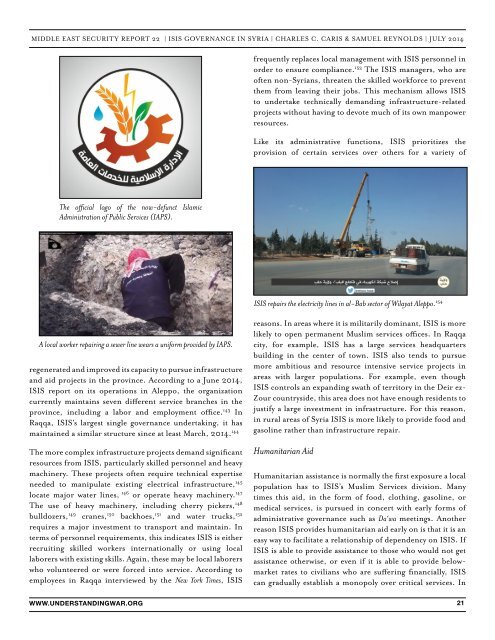ISIS_Governance
ISIS_Governance
ISIS_Governance
You also want an ePaper? Increase the reach of your titles
YUMPU automatically turns print PDFs into web optimized ePapers that Google loves.
Middle East Security Report 22 | <strong>ISIS</strong> <strong>Governance</strong> in syria | Charles C. Caris & Samuel Reynolds | july 2014<br />
frequently replaces local management with <strong>ISIS</strong> personnel in<br />
order to ensure compliance. 153 The <strong>ISIS</strong> managers, who are<br />
often non-Syrians, threaten the skilled workforce to prevent<br />
them from leaving their jobs. This mechanism allows <strong>ISIS</strong><br />
to undertake technically demanding infrastructure-related<br />
projects without having to devote much of its own manpower<br />
resources.<br />
Like its administrative functions, <strong>ISIS</strong> prioritizes the<br />
provision of certain services over others for a variety of<br />
The official logo of the now-defunct Islamic<br />
Administration of Public Services (IAPS).<br />
<strong>ISIS</strong> repairs the electricity lines in al-Bab sector of Wilayat Aleppo. 154<br />
A local worker repairing a sewer line wears a uniform provided by IAPS.<br />
regenerated and improved its capacity to pursue infrastructure<br />
and aid projects in the province. According to a June 2014,<br />
<strong>ISIS</strong> report on its operations in Aleppo, the organization<br />
currently maintains seven different service branches in the<br />
province, including a labor and employment office. 143 In<br />
Raqqa, <strong>ISIS</strong>’s largest single governance undertaking, it has<br />
maintained a similar structure since at least March, 2014. 144<br />
The more complex infrastructure projects demand significant<br />
resources from <strong>ISIS</strong>, particularly skilled personnel and heavy<br />
machinery. These projects often require technical expertise<br />
needed to manipulate existing electrical infrastructure, 145<br />
locate major water lines, 146 or operate heavy machinery. 147<br />
The use of heavy machinery, including cherry pickers, 148<br />
bulldozers, 149 cranes, 150 backhoes, 151 and water trucks, 152<br />
requires a major investment to transport and maintain. In<br />
terms of personnel requirements, this indicates <strong>ISIS</strong> is either<br />
recruiting skilled workers internationally or using local<br />
laborers with existing skills. Again, these may be local laborers<br />
who volunteered or were forced into service. According to<br />
employees in Raqqa interviewed by the New York Times, <strong>ISIS</strong><br />
reasons. In areas where it is militarily dominant, <strong>ISIS</strong> is more<br />
likely to open permanent Muslim services offices. In Raqqa<br />
city, for example, <strong>ISIS</strong> has a large services headquarters<br />
building in the center of town. <strong>ISIS</strong> also tends to pursue<br />
more ambitious and resource intensive service projects in<br />
areas with larger populations. For example, even though<br />
<strong>ISIS</strong> controls an expanding swath of territory in the Deir ez-<br />
Zour countryside, this area does not have enough residents to<br />
justify a large investment in infrastructure. For this reason,<br />
in rural areas of Syria <strong>ISIS</strong> is more likely to provide food and<br />
gasoline rather than infrastructure repair.<br />
Humanitarian Aid<br />
Humanitarian assistance is normally the first exposure a local<br />
population has to <strong>ISIS</strong>’s Muslim Services division. Many<br />
times this aid, in the form of food, clothing, gasoline, or<br />
medical services, is pursued in concert with early forms of<br />
administrative governance such as Da‘wa meetings. Another<br />
reason <strong>ISIS</strong> provides humanitarian aid early on is that it is an<br />
easy way to facilitate a relationship of dependency on <strong>ISIS</strong>. If<br />
<strong>ISIS</strong> is able to provide assistance to those who would not get<br />
assistance otherwise, or even if it is able to provide belowmarket<br />
rates to civilians who are suffering financially, <strong>ISIS</strong><br />
can gradually establish a monopoly over critical services. In<br />
www.Understandingwar.org<br />
21


